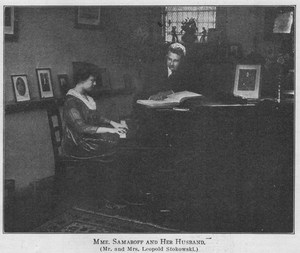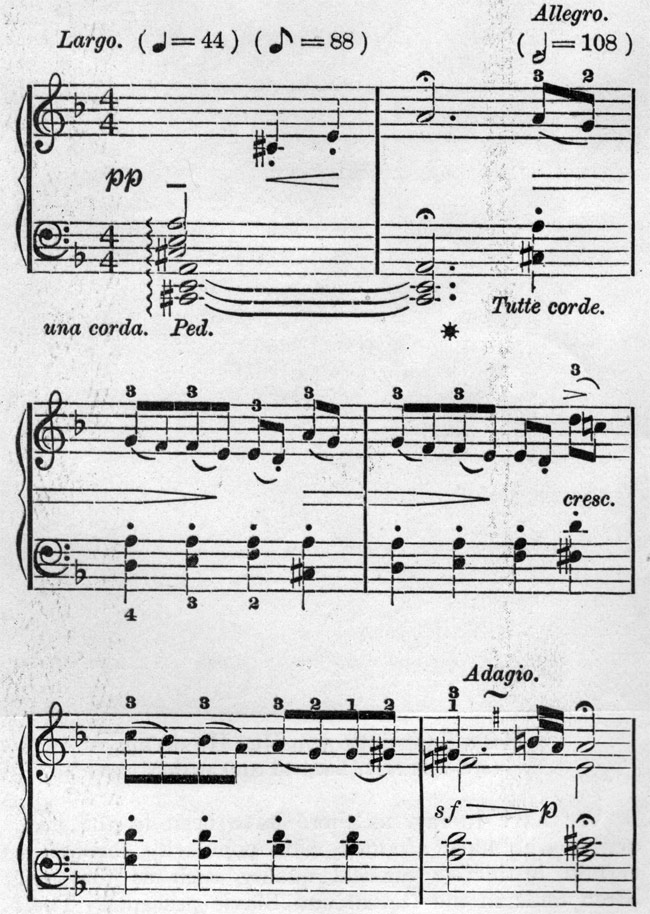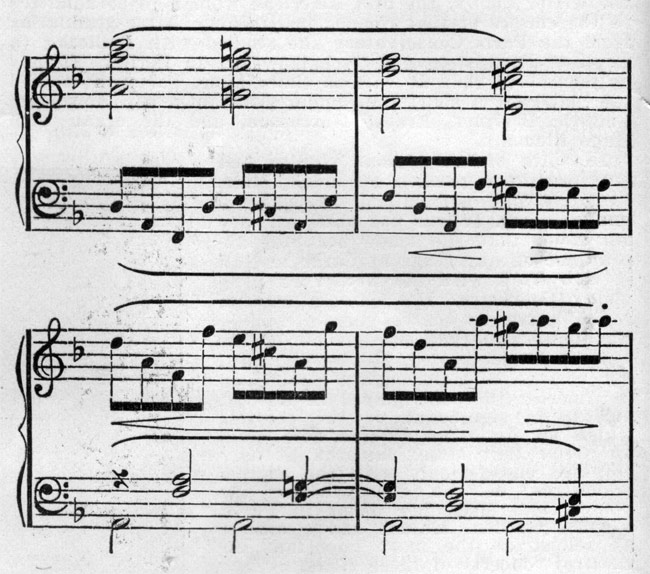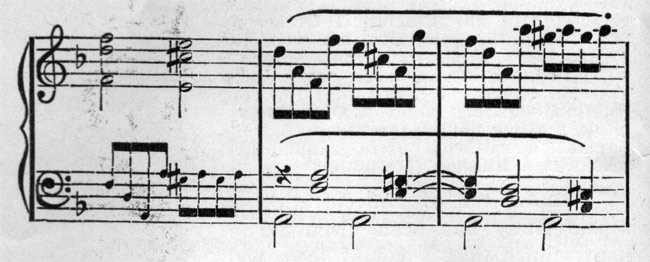An Interview Secured Expressly for The Etude with the Distinguished Pianist OLGA SAMAROFF
(Mrs. Leopold Stokowski)
[Editorial Note.—Olga Samaroff (Mrs. Leopold Stokowski) was born on August 8, 1882, in San Antonio, Texas. Her mother, the daughter of George Loening, a native of Bremen, Germany, was born in Munich but educated in America. Her father is of Holland Dutch extraction. Mme. Samaroff received her first instruction from her maternal grandmother and mother, both tine musicians. At the age of fourteen she entered the Paris Conservatory, being, so far as the writer knows, the first American woman to be admitted to the classes of that famous institution. After graduating from the Paris Conservatory she studied with Jedliczka (a pupil of Rubinstein and Tschaikowsky) in Berlin. It may be mentioned that at various times Mme. Samaroff studied the piano for a short time under Constantin von Sternberg, Ludovic Breitner, Ernest Hutcheson, and the organ with Hugo Riemann.
In spite of her serious studies and ever prominent passion for music, Mme. Samaroff did not intend to make a public career. It was not until January 18, 1905, that she made her first appearance on any stage at Carnegie Hall in New York with the New York Symphony Orchestra. Her success was so rapid that many concert-goers are under the impression that she has played for a much longer period. It was not until her success was thoroughly established in America that she played in Europe, and it is significant of the prestige which an American success now gives an artist that Mme. Samaroff at once obtained engagements with the leading orchestras in the cities where she played, and made her dèbut in Paris, Vienna, London, Munich and elsewhere as soloist at the most important orchestral concerts of those cities.
After this single season in Europe and four seasons in America, Mme. Samaroff’s career was interrupted by a very serious illness, which forced her to abandon all concert work for nearly four years. Three years ago she became the wife of Leopold Stokowski, then conductor of the Cincinnati Orchestra, now filling the same position with the Philadelphia Orchestra. Mme. Samaroff will resume her concert work next autumn. It may be added that the very Russian sounding name of Olga Samaroff is a stage name—the name of Mme. Samaroff’s maternal great-grandmother, who was a Russian.]
 “The subject of concentration in music study has been discussed so many times that it would seem well nigh impossible to say anything about it approaching novelty. Yet, concentration is a matter of such great consequence to all students, particularly music students, that there are few artists who would hesitate to place it at the very foundation of all serious work. Successful concentration is a mental process attained only after much intellectual effort. There is unfortunately a tendency among certain American students to look upon anything intellectual connected with music with more or less contempt. They do not hestitate (sic) to criticize certain great artists in such a way that one readily discovers that the students makes ‘intellect’ synonymous with inferiority. One realizes how absurd this is when one remembers that all higher musical work is based upon a development of the individual’s intellectuality.
“The subject of concentration in music study has been discussed so many times that it would seem well nigh impossible to say anything about it approaching novelty. Yet, concentration is a matter of such great consequence to all students, particularly music students, that there are few artists who would hesitate to place it at the very foundation of all serious work. Successful concentration is a mental process attained only after much intellectual effort. There is unfortunately a tendency among certain American students to look upon anything intellectual connected with music with more or less contempt. They do not hestitate (sic) to criticize certain great artists in such a way that one readily discovers that the students makes ‘intellect’ synonymous with inferiority. One realizes how absurd this is when one remembers that all higher musical work is based upon a development of the individual’s intellectuality.“The precious divine spark which the artist must keep flaring on his high altar is not to be dimmed by higher mental culture. But the emotional content of the artist’s interpretation will not be lessened because he uses his brain every second during his study hours. It is true that we often hear music performed with a kind of technical coldness which many ascribe to a superior intellectual attitude—the divine spark quite extinct. We can but say that the warmth of emotion, the fervor of interpretative genius, never existed in the soul of the performer. If it had, no amount of so- called ‘intellectual effort’ would have done away with it. The bête noir ‘intellect’ has misled many a careless student who has imagined that by some mysterious process musical success will come to him without any special mental industry. I would in fact almost be inclined to say that while an intellectual ‘performer’ may lack the divine spark the performer with the divine spark in the highest sense can not be lacking in intellect, but on the contrary is one of the highest manifestations of the possibilities of intellectual achievement.
“We have to-day, as there have been in the past, artists who have attained wide popularity through a certain instinctive musical quality such as that one often finds in the Italian and Slavic peasants. Their music seems to come to them apparently without study, as though they work entirely through the sub-conscious mind. Such musicians combine a certain amount of fire and natural breadth of tone, and, for want of a better term, ‘magnetism.’ Often such a musician succeeds in casting a spell over an audience, particularly an undiscriminating one. Such a performer was Blind Tom, a mere freak of nature. To my mind, however, these performers do not deserve to be seriously considered as artists. The truly great artist is one who not only possesses all the gifts which the natural performer may have, but who also combines these with intellectual breadth achieved through years of intelligent study and experience.
MAKING ONE’S PRACTICE A THOUSANDFOLD MORE VALUABLE.
“The student then should have a high regard for all intellectual work demanded by his music study, technical mastery, and all those faculties which make for a refined understanding of music considered from the highest aspect. Let us repeat to those who hesitate to consider the intellectual processes in their work—if the flame of genius within the musician is so feeble that it could be extinguished by the development and use of his grey matter it would scarcely in any case be capable of producing distinguished artistic results. Of all the intellectual processes none is more helpful to the student than concentration—directing one’s thinking powers toward one thing and keeping them upon that thing until some definite purpose is accomplished. The student should always fasten upon the conviction that whatever is his in the way of natural talent is there to remain. Concentration upon technical details will enhance the value of his natural talent a thousand fold. There are doubtless hundreds of students now who are struggling along hopelessly because they do not know how to concentrate their forces. Why will some students persist in being so short-sighted in this particular? The playing of Bach demands concentration in a remarkable degree. Yet, I have students come to me and say, ‘If I play Bach I shall not be able to play Chopin.’ One might as well say, ‘If I read Shakespeare I shall not be able to read Maeterlinck.’ Can anyone imagine anything more absurd? The qualities which one develops through playing Bach are of incalculable benefit in playing Chopin.
NO PATENT RULES FOR CONCENTRATION.
“By concentration the student must not imagine that I have any proprietary methods in mind. There are no patents, no rules, no schemes. What is needed is everyday common sense. Common sense ought to reveal to the average student that if he can play a passage once correctly he should be able to play it again and again correctly, if only he reproduces the same degree of concentration which insured perfection in the first case. That is to say, that if the student’s technical ability and musical understanding encompass a passage in question once, it is largely a matter of mind control if the student succeeds in reproducing the passage without the customary needless and wasteful repetitions through which so many students go before they seem to get results. Every time the passage you have selected for practice fails to ‘go right’ after you have once succeeded in playing it to your satisfaction just tell yourself that you are not concentrating. Some misguided young musicians seem to fail in realizing that in order to insure results one must invariably preserve that intimate connection between the brain and the fingers that spells concentration. They seem to think that they may dream away at the keyboard and let their blundering digits take care of themselves. Years of study are wasted in this way and the ears of students, to say nothing of others who are obliged to listen, are tortured by bungling practice that never in all the world can possibly lead to real success.
“The first mistake, like all first offences, is the beginning of the end unless the student takes great care to avoid such a custom. Mistake making in most cases is an entirely avoidable habit, often resulting from not checking the matter at the very start. If the student would only learn to stop the very moment that the first mistake is made and give himself a severe lecture on the lack of concentration he would stand a far better chance of ultimate success than if he blindly continued to conceal his blunders under that most deceptive of legends ‘Practice makes Perfect.’ Practice does make perfect, it is true, but only right practice brought about by concentration can lead to the perfection which all young musicians aspire to attain. It is not lack of talent, not lack of opportunity, not lack of atmosphere which stands in the way of many students—it is wool-gathering. In the olden time the shepherd boys used to run far and wide over the hills and dales for little clumps of wool left hanging on bushes. It was a task with slender profit that demanded thousands of steps for very little wool. In some similar manner some pupils run through miles of scales, arpeggios and finger passages in order to get very little out of them. The successful performer has not time for this wasteful practice. He must get his results with as few wasted notes as possible.
A FAMOUS ACTOR’S POWER OF CONCENTRATION.
“This does not mean, however, that numerous repetitions are undesirable or unnecessary. I recollect a story told to me by an old friend, Ernest Coquelin, the famous French actor, which illustrates how a great artist, even in another branch of interpretative art, realizes the necessity for concentration upon detail. In the play of Thermidor, in which Coquelin gave a really marvelous performance, there was a little passage in which he was obliged to get up and walk around a chair. All the while he was obliged to signify the dawning realization of a great danger. Coquelin told me that in order to master the ways and means leading to an impressive theatrical effect that the audience would at once perceive and comprehend he once practiced the little bit some two hundred times. With every repetition he became more and more absorbed, so that he entirely forgot everything else. Not only did several important engagements escape his mind, but he also failed to remember that he was to take a certain train for the south of France, where he was engaged to appear, thus losing his last chance for a lucrative performance. It seems needless to say that all those who saw his performance were especially impressed by this particular passage.
“To the artist who has once gained complete control of himself and his medium there is such a thing as a sub-conscious governing or directing by the mind which gives him sureness and a kind of technical liberty, permitting his imagination to have the freest possible play. But this sub-conscious governing of our work comes only with the complete control resulting from years and years of right practice habits at the keyboard. Most of the problems confronting the average student and performer may be solved by the kind of concentrated thinking which comes through the habit of collecting one’s thoughts and focusing them upon one point until something is actually accomplished.
“In preparing a passage for public performance the student should endeavor to keep in mind the ultimate manner in which the passage will be performed. That is to say, he will gain nothing by practicing the passage in any other way. The idea surprisingly advocated by some otherwise fine teachers of always practicing things as they are not to be played eventually, has always struck me as preposterous. Some teachers tell their pupils to disregard the phrasing, the pedaling, the expression marks, etc. It is easy to see how the student can, by giving special attention to any one of these phases of his playing through concentration develop that phase, but at the same time he must realize that in playing a single measure he is called upon not to do one thing only, but to control many different things all occurring at the same instant. That is one of the things that makes music study so fascinating. The mind is given one short moment to perform a number of different actions and these must be executed with perfection of digital detail, fine appreciation of artistic values and correspondence with the rest of the composition. The artist with the brush may stand before his easel for months, painting, painting, painting, erasing one color here and supplying a line there, but he has all eternity in which to complete his task if he chooses to take it. The canvas of the interpretative musician is the attention of his listener. He paints at a miraculously rapid rate and his mind must be trained to think with a speed demanded in no other art except perhaps that of the stage. This in itself should emphasize the necessity for concentration in study so that the student will realize how very vital it is to his progress.
“I find pupils who will completely learn and produce the notes of a work and expect by some mysterious means to be able to supply all the fine points of phrasing, accenting, pedaling and correct tempo at the moment of playing, without any detailed concentration upon these matters before the hour of the concert. Before the student permits his work to reach the ears of the auditor he must have studied not only in all its parts but he must have played it many, many times just as he expects to play it on the evening of its ultimate performance. He must concentrate upon his work so that he can sit at the keyboard with supreme confidence and paint a tonal picture that will leave a permanent artistic impression upon the mind of the hearer. If the student would only keep before him the fact that he has such a very short time in which to create a master work in interpretation he will surely see that he can not afford to waste any moments during his practice periods in wool-gathering.
DON’T TRY TO DO TOO MUCH AT ONCE.
“Some students attempt to learn a whole composition at one time. This usually results in a succession of disasters. The student works prodigiously and produces nothing. For instance, in the Beethoven Sonata in D Minor (Opus 31, No. 2), there are 232 measures in the first movement. The right way to proceed after a general idea of the movement has been obtained through a cursory survey of the piece is to take, let us say eight measures. In this case we will take the first eight measures which appear thus:

“Very simple you will say, but let us make a little catalog of the things you must observe in this little passage which takes only a few seconds to play. Considering them in order we must learn:
Seventy-three notes.
Thirteen marks of phrasing.
Three marks of tempo.
Three important pedaling marks.
Sixteen marks indicating a certain kind of touch.
Nine marks pertaining to dynamics (cres. sf., etc.).
Twenty-three fingerings specified by some painstaking editor.
Two significant pauses.
“An embellishment which must be properly interpreted. And all in eight measures! Yet, the student has only skimmed over the surface of the measures. He must study the nature of the phrasing not indicated in the phrasing marks; he must know how the opening arpeggio is to be played; he must note the extent of the main theme before the second theme is introduced; in fact there are many things yet to be considered in this little passage of eight measures. Some people have the gift of observing, comprehending and fixing these technical and artistic points so that they are able to do the work in a much shorter time. These people are those who have learned to concentrate.
HOW CONCENTRATION HELPS MEMORIZING.
“Concentration helps immensely in memorizing— indeed it hardly seems necessary to mention this very obvious fact. One little device I have employed in memorizing may be of assistance to the student. In studying a new phrase with the view to fixing it in the mind one should not merely study the phrase alone but also part of the preceding phrase. The actor in studying his parts lays great stress upon his cues. He learns the last words of the previous speech so that the moment he hears them his own lines come out automatically—that is without apparent thought or effort. In memorizing I apply a similar method which seems to help me immensely in works of a complicated nature. In studying a new phrase I always commence in the middle of the previous phrase. For instance, in a section of the sonata to which we have just referred we find these two phrases:

In memorizing the second phrase I would practice it as follows:

“This gives to the musical memory the same assistance upon which the actor depends for his security in reciting his lines on the stage.
“A great deal may be gained by watching the fingers on the keyboard. Of course this refers only to the work of the pianist playing from memory. It may be necessary at the outstart for the student to practice with his eyes away from the keyboard, but after the student has gained a sense of location he will find that his eyes will help him immensely in preserving accuracy. One famous virtuoso, one of the very greatest, always keeps his eyes upon the keys. The superficial student might think that this would make the playing of the virtuoso stilted, and lacking in the abandon of the old type of pianist, who focused his eyes on the ceiling, and his fingers on the wrong notes. However, there is something in the attraction of the keyboard that becomes almost hypnotic and the eye learns to help make the playing more definite, more dependable, while at the same time the poet interpreter’s imagination is not robbed of any of its phantasy.
“It is gratifying to note that American artists are gaining more and more recognition in their own land. No symbol of our musical progress could be more wholesome and the American’s ability to focus his efforts upon the business at hand has had much to do with this change in public musical appreciation.”



